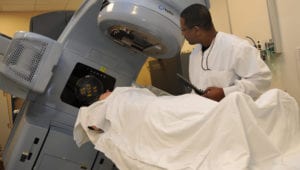Radiotherapy LIkely to Play a Bigger Role in Future Mesothelioma Therapy
 New research suggests that radiotherapy is likely to play a larger role in the multi-modal treatment of malignant pleural mesothelioma in the future, supporting and enhancing treatments such as surgery and immunotherapy.
New research suggests that radiotherapy is likely to play a larger role in the multi-modal treatment of malignant pleural mesothelioma in the future, supporting and enhancing treatments such as surgery and immunotherapy.
Radiation scrambles the DNA inside cancer cells, interrupting their life cycle and making replication impossible. If it were possible to irradiate only mesothelioma cells without affecting the surrounding healthy tissue, radiotherapy might even be able to cure cancers like mesothelioma.
But as the authors of a new study published in the Journal of Thoracic Disease point out, until recently, radiotherapy has been of limited use in the treatment of mesothelioma because it hasn’t been precise enough.
Thanks to new technology, that is changing.
Why Mesothelioma is Hard to Treat with Radiotherapy
Pleural mesothelioma grows in a thin layer across the membrane that wraps around the lungs. The irregular shape of mesothelioma tumors and their proximity to critical organs like the heart and lungs make them especially difficult to treat with traditional external beam radiotherapy.
As a result, radiotherapy his primarily been used in a limited way to help alleviate certain mesothelioma symptoms rather than as a curative treatment.
Now, researchers at the University of Pennsylvania’s Perelman School of Medicine say new treatment planning techniques and technologies such as stereotactic body radiotherapy (SMRT). intensity modulated radiotherapy (IMRT), and proton-based radiotherapy are improving the precision – and the usefulness – of radiotherapy for mesothelioma.
Radiotherapy and Multi-Modal Mesothelioma Treatment
According to the new study, the real value of radiotherapy in the treatment of pleural mesothelioma may be as an adjunct to other therapies like surgery or immunotherapy.
In the context of surgery, precision radiotherapy is now being used to shrink mesothelioma tumors prior to surgery to make them easier to remove. The authors say this can make it more feasible to perform lung-sparing PD surgery.
Radiotherapy can also be used after surgery to help prevent the development of new mesothelioma tumors.
In addition, radiotherapy has an immune system-stimulating effect that may help support mesothelioma immunotherapy treatments.
“Further improvements in the technological sophistication of the apparatus, planning systems and techniques for RT delivery along with clinical innovation will continue to afford new uses of RT in the management of patients with malignant pleural mesothelioma,” concludes lead study author, radiation oncologist, Gwendolyn Cramer.
Source:
Cramer, G, et al, “Adjuvant, neoadjuvant, and definitive radiation therapy for malignant pleural mesothelioma”, August 2018, Journal of Thoracic Disease





